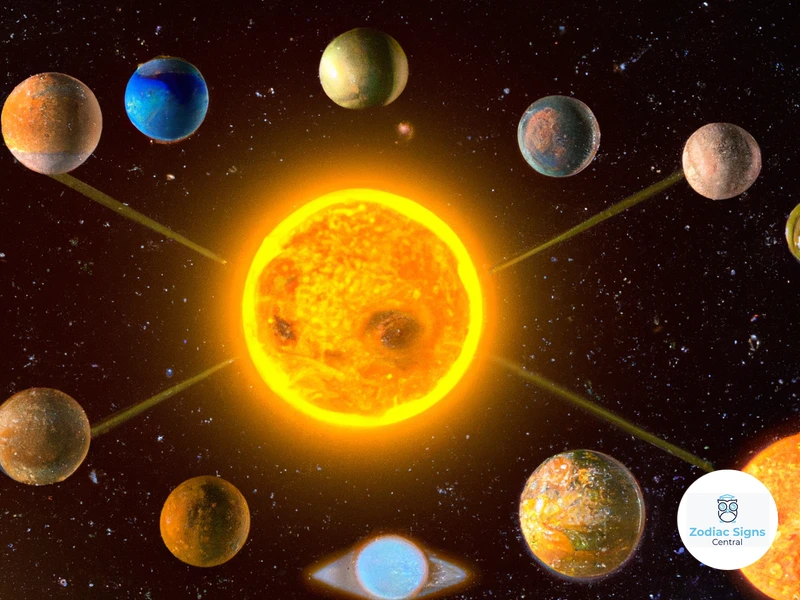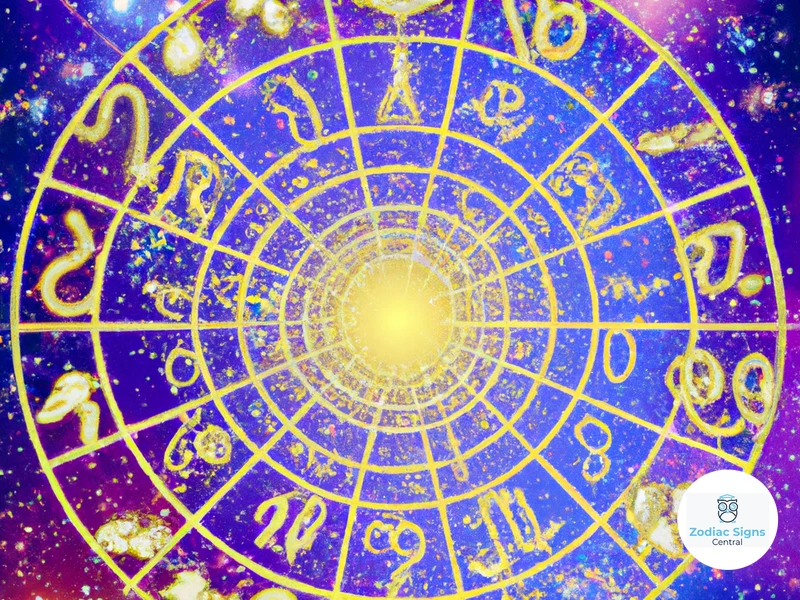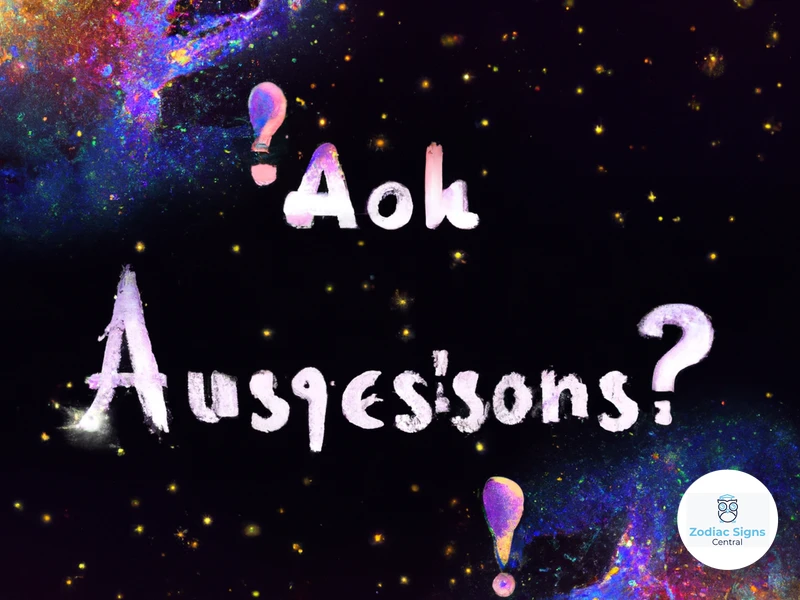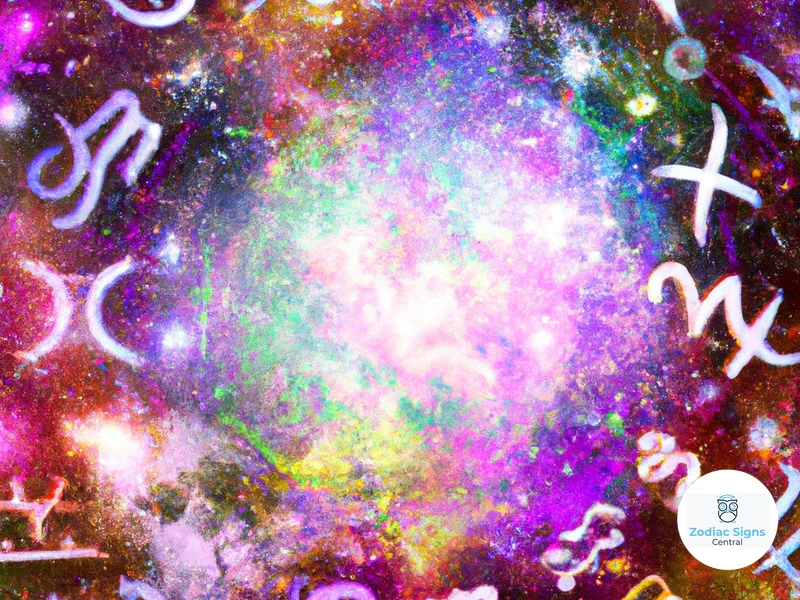Astrological compatibility is a fascinating topic that has captivated humans for centuries. People have always sought ways to understand and navigate their relationships, and one avenue for examination is through sun signs. The sun sign is the foundation of a person’s astrological profile and represents their core essence and identity. It is determined by the position of the sun at the exact moment of their birth and is believed to influence their personality and behaviors. In this article, we will delve into the importance of sun signs in astrological compatibility, exploring how they shape our relationships and provide valuable insights into our interactions with others. So, let’s embark on a journey to unravel the mysteries of sun signs and discover their significance in the intricate tapestry of astrology.
What Are Sun Signs?

Sun signs, also known as zodiac signs, are a key component of astrology. They represent the position of the sun at the moment of a person’s birth and are the most well-known aspect of astrological analysis. The zodiac is divided into twelve signs, each spanning 30 degrees of the celestial sphere. These signs are Aries, Taurus, Gemini, Cancer, Leo, Virgo, Libra, Scorpio, Sagittarius, Capricorn, Aquarius, and Pisces. Each sign corresponds to a specific time period of the year and is associated with distinct characteristics, traits, and energies. Understanding one’s sun sign provides a foundation for self-awareness and self-expression. Additionally, sun signs are often used to analyze compatibility between individuals. By comparing the sun signs of two people, astrologers can gain insights into the dynamics and potential challenges within a relationship. However, it is important to note that sun signs are just one piece of the astrological puzzle and should not be solely relied upon for a comprehensive understanding of compatibility. It is crucial to consider other astrological factors, such as moon signs and rising signs, for a more accurate assessment. The study of astrology, including sun signs, has a rich history and has evolved over centuries. To explore more about the origins and evolution of Western astrology, you can read the article “Origins and Evolution of Western Astrology“.
Understanding Astrological Compatibility
Understanding astrological compatibility is an intricate process that involves examining the interplay of various astrological factors to determine the potential harmony or challenges in a relationship. Astrological compatibility is based on the belief that celestial bodies and their positions at the time of someone’s birth can influence their personality, emotions, and behaviors. When it comes to relationships, astrology asserts that individuals who have compatible astrological placements are more likely to resonate with each other on deeper levels. While sun signs play a significant role in compatibility analysis, it is important to consider other factors such as moon signs, rising signs, and the positions of other planets in the birth chart. The moon sign, for instance, represents one’s emotional nature and instincts, and it greatly affects the way individuals express and receive love. To explore more about the role of moon signs in love compatibility, you can read the article “The Role of Moon Signs in Love Compatibility“. Additionally, it is essential to understand the symbolism and meanings associated with different planets and their influences in astrology. Neptune, for example, represents illusion, spirituality, and dreams. To delve deeper into the symbolism of Neptune in astrology, you can read the article “Symbolism and Meanings of Neptune in Astrology“. By considering these various astrological factors, individuals can gain a more comprehensive understanding of their compatibility with others and navigate their relationships with awareness and insight.
The Significance of Sun Signs in Compatibility

The significance of sun signs in compatibility cannot be understated. While the sun sign is just one aspect of a person’s astrological profile, it holds a powerful influence over their personality and behaviors. When two individuals compare their sun signs for compatibility, they gain valuable insights into their potential strengths and challenges as a couple. The sun sign represents the core essence and identity of a person, so understanding the compatibility between two sun signs can shed light on how these individuals may interact, communicate, and relate to each other. It can reveal shared qualities and values that can contribute to a harmonious relationship, as well as potential areas of conflict that may arise due to incompatible traits. By exploring the compatibility of sun signs, individuals can gain a deeper understanding of their relationships and navigate them with greater awareness and insight.
The Influence of Sun Signs
The influence of sun signs in astrology is profound and far-reaching. The sun represents our core essence and ego, and its placement in our birth chart holds significant sway over our individuality and sense of self. Each sun sign possesses unique qualities and characteristics that shape how we perceive the world and interact with others. For example, an individual with a Leo sun sign may exhibit traits such as confidence, warmth, and a natural flair for leadership, while someone with a Pisces sun sign might display creativity, empathy, and a deep emotional sensitivity. These inherent qualities can greatly impact our relationships and compatibility with others. The influence of sun signs extends beyond just our essential nature; it also governs our wants, desires, and the qualities we seek in a partner. For instance, a Taurus sun sign individual may value stability, loyalty, and sensuality in their relationships, while an Aquarius sun sign person may prioritize intellectual connection, freedom, and innovation. Understanding the influence of sun signs can offer valuable insights into ourselves and our relationships, helping us navigate conflicts, embrace compatibility, and foster personal growth.
Matching and Clashing Sun Signs
Matching and clashing sun signs play an intriguing role in astrological compatibility. When two individuals have sun signs that are harmonious and align well, it can create a strong foundation for a relationship. These matches often have a natural understanding and flow, as their energies and personalities complement each other. For example, fire signs like Aries, Leo, and Sagittarius tend to get along well with each other due to their shared passion, energy, and adventurous nature. Similarly, earth signs such as Taurus, Virgo, and Capricorn have a grounded and practical approach to life, making them compatible with one another.
On the other hand, clashing sun signs can present challenges in a relationship. These matches may experience more friction and conflicting energies. For instance, a fiery Aries may clash with a watery Cancer, as their approaches to life and emotional expression differ greatly. However, it is important to remember that compatibility is not solely determined by sun signs, and many factors contribute to the dynamics of a relationship.
To gain a comprehensive understanding of compatibility, it is essential to consider the entire birth chart. The birth chart takes into account the positions of all the planets at the time of an individual’s birth, providing a more nuanced view of their personality and potential compatibility. It reveals information about other influential factors such as moon signs, rising signs, and the placements of different planets in various houses.
Understanding the complexities of astrological compatibility requires a holistic approach that takes into account the various aspects of a person’s birth chart. By considering both matching and clashing sun signs, along with other astrological placements, individuals can gain valuable insights into the dynamics of their relationships and navigate them with greater understanding.
Beneficial Sun Sign Combinations
When it comes to astrological compatibility, certain sun sign combinations tend to have a harmonious and beneficial dynamic. These combinations are often seen as having natural affinity and understanding between the individuals involved. Here are some examples of beneficial sun sign combinations:
1. Aries and Gemini: Both Aries and Gemini are energetic and love to explore new ideas and experiences. Their dynamic and adventurous nature creates a stimulating and exciting partnership.
2. Taurus and Cancer: Taurus and Cancer are both nurturing signs that prioritize stability and emotional security. Their shared values and commitment to creating a loving and supportive home environment make them a strong and harmonious match.
3. Leo and Libra: Leo and Libra both have a flair for drama and love being in the spotlight. Their shared love for romance, creativity, and socializing creates a vibrant and dynamic relationship.
4. Scorpio and Pisces: Scorpio and Pisces are both deeply emotional and intuitive signs. Their empathetic and mysterious nature allows them to understand each other on a profound level, creating a strong emotional bond.
5. Sagittarius and Aquarius: Both Sagittarius and Aquarius are independent and freedom-loving signs. They appreciate each other’s need for personal space and intellectual stimulation, making their relationship exciting and full of mutual respect.
It’s important to remember that while these combinations are often considered beneficial, individual experiences may vary. Factors such as moon signs and rising signs will also influence the overall compatibility between individuals. Astrology provides a general framework to understand relationship dynamics, but personal connection and communication play a crucial role in the success of any partnership.
Factors Beyond Sun Signs
While sun signs play a significant role in astrological compatibility, there are several other factors beyond sun signs that contribute to the intricacies of a relationship. One important consideration is the placement of other celestial bodies in the birth chart. The moon, for example, represents emotions and instincts, offering insight into how individuals express their feelings and navigate their emotional worlds. The rising sign, also known as the ascendant, reflects a person’s outward personality and how they present themselves to the world. The positions of Venus and Mars in the birth chart indicate the individual’s approach to love and romance, as well as their desires and passions. Additionally, aspects, which are the angles formed between planets, provide further depth and complexity to the analysis. Interpreting the whole birth chart, which takes into account these various factors and their interactions, provides a more comprehensive understanding of compatibility and relationship dynamics. By considering the dynamic interplay of these elements, astrologers gain a more nuanced perspective on the dynamics within a relationship and can offer valuable insights into how to navigate challenges and enhance harmonious connections.
Importance of Other Astrological Placements
While sun signs play a significant role in astrological compatibility, it is important to consider other astrological placements for a more comprehensive understanding. One such important placement is the moon sign. The moon sign represents a person’s emotions, instincts, and subconscious mind. It reveals how they relate to their own emotions and how they express their feelings in relationships. When comparing moon signs, it can provide valuable insights into the emotional compatibility between individuals. Additionally, the rising sign, also known as the ascendant, is another crucial placement to consider. The rising sign signifies the impression a person makes on others and how they present themselves to the world. It reflects their outward behavior and appearance. By incorporating the rising sign into astrological compatibility analysis, a more complete picture of the dynamics within a relationship can be obtained. Other astrological factors, such as the positions of Venus and Mars, also contribute to compatibility assessment. Venus represents love, harmony, and attraction, while Mars represents passion, energy, and assertiveness. Evaluating the placement of these planets in each individual’s birth chart can shed light on the romantic and sexual dynamics between partners. While sun signs provide a foundation for understanding compatibility, considering other astrological placements such as moon signs, rising signs, and planetary positions can enhance the accuracy and depth of astrological analysis.
Interpreting the Whole Birth Chart
Interpreting the whole birth chart is a complex yet crucial aspect of astrological compatibility. While sun signs provide valuable insights, they only scratch the surface of a person’s astrological profile. The birth chart, also known as the natal chart, is a map of the sky at the time of a person’s birth and takes into account the positions of the sun, moon, planets, and other celestial bodies at that moment. It provides a comprehensive understanding of an individual’s personality, strengths, weaknesses, and potential compatibility with others. To interpret a birth chart, astrologers consider the placement of all the planets in the different astrological signs and houses. Each planet represents different aspects of a person’s life, such as emotions (moon), communication (Mercury), love and relationships (Venus), and ambition (Mars). The interactions and aspects between these planets are also analyzed to gain a deeper understanding of an individual’s tendencies and potential challenges in relationships. By examining the birth chart as a whole, astrologers can provide a more accurate and nuanced analysis of astrological compatibility. It reveals intricate details such as shared values, communication styles, emotional compatibility, and areas of potential conflict within a relationship. To truly comprehend the dynamics between two individuals, it is essential to move beyond just sun signs and dive into the depths of the birth chart.
Personal Growth and Understanding

Personal growth and understanding are two invaluable aspects that can be enhanced through the study of sun signs and astrology. By delving into our sun sign characteristics and exploring how they interact with others, we gain valuable insights into our strengths, weaknesses, and patterns of behavior. Understanding our own tendencies allows us to make conscious choices in our relationships and personal development. Sun signs provide a framework for self-reflection and self-improvement, offering guidance on areas where we can focus our efforts. For example, if someone has a Leo sun sign, they may have a natural inclination towards leadership and creativity. By embracing these qualities and exploring avenues that allow for self-expression, such as pursuing a leadership role or engaging in artistic endeavors, individuals can tap into their full potential and experience personal growth. Understanding the sun signs of others enables us to develop empathy and compassion. When we recognize that people have different ways of expressing themselves based on their sun sign, we can navigate conflicts and communicate effectively. This knowledge allows us to celebrate diversity and appreciate the unique qualities that each individual brings to the table. In essence, personal growth and understanding through sun signs empower us to embark on a journey of self-discovery and cultivate harmonious relationships with others.
Conclusion
In conclusion, sun signs hold significant importance in astrological compatibility. They provide us with valuable insights into our own personalities and behaviors, as well as the dynamics of our relationships. Understanding our sun sign can help us navigate our interactions with others and develop deeper connections. However, it is essential to remember that sun signs are just one aspect of astrology and should not be solely relied upon for comprehensive compatibility analysis. Other factors, such as moon signs and rising signs, play a crucial role in shaping our personalities and relationships. Exploring these aspects can lead to a more nuanced understanding of ourselves and our connections with others. Astrology is a complex and multifaceted system that offers endless opportunities for personal growth and self-discovery. By delving into the depths of our birth charts, we gain a greater understanding of our strengths, weaknesses, and potential areas for growth. So, let us embrace the power of astrology, including the significance of sun signs, as we embark on a journey of self-exploration and connection.
Frequently Asked Questions

1. What is the significance of sun signs in astrology?
Sun signs play a crucial role in astrology as they represent a person’s core essence and identity. They provide insights into an individual’s personality traits, behaviors, and motivations.
2. Can sun signs determine compatibility between two people?
Sun signs can offer valuable insights into compatibility, but they should not be the sole determining factor. Other astrological placements, such as moon signs and rising signs, need to be considered for a more holistic assessment of compatibility.
3. Do matching sun signs ensure a successful relationship?
While matching sun signs can indicate shared traits and similarities, a successful relationship depends on various factors, including communication, shared values, and emotional compatibility. It is important to look beyond sun signs for a deeper understanding of the relationship dynamics.
4. Can people with clashing sun signs have a harmonious relationship?
Clashing sun signs may present challenges, but they also offer an opportunity for growth and understanding. With effective communication, compromise, and a willingness to learn from each other, people with clashing sun signs can cultivate a harmonious relationship.
5. Are there any sun sign combinations that are particularly beneficial?
Certain sun sign combinations tend to complement each other well. For example, signs that share similar elements, such as fire and air or earth and water, often have good chemistry. However, individual birth charts and other astrological factors must be considered for a more accurate assessment.
6. Is astrology solely based on sun signs?
No, astrology encompasses a wide range of factors, including moon signs, rising signs, and placements of other planets in the birth chart. These additional elements provide a more comprehensive understanding of an individual’s astrological profile.
7. What is the importance of other astrological placements in compatibility?
Other astrological placements, such as moon signs and rising signs, offer valuable insights into emotional compatibility, communication styles, and overall compatibility. They provide a more nuanced understanding of the dynamics between two individuals.
8. How can one interpret the whole birth chart?
Interpreting the whole birth chart involves analyzing the positions of all the planets, including the sun, moon, and rising signs, as well as the aspects formed between them. This comprehensive analysis helps astrologers understand the individual’s unique strengths, challenges, and potential in various areas of life.
9. Can astrology help with personal growth and understanding?
Astrology can be a powerful tool for personal growth and self-awareness. By understanding the astrological influences at play, individuals can gain insights into their strengths, challenges, and life purpose, leading to personal development and a deeper understanding of themselves.
10. Is astrology scientifically proven?
Astrology is not considered a science in the traditional scientific sense. It is a metaphysical and symbolic system that has been practiced for thousands of years. While many people find value in astrology, it is important to approach it with an open mind and use it as a tool for self-reflection rather than absolute truth.
References
Frequently Asked Questions

1. Can Sun signs alone determine astrological compatibility?
No, while Sun signs play a significant role, other factors like Moon signs, rising signs, and planetary placements also play a crucial part in determining astrological compatibility.
2. Are certain Sun sign combinations more compatible than others?
Yes, certain Sun sign combinations tend to have a natural affinity for each other, while others may require more effort and compromise. However, compatibility is not solely dependent on Sun signs.
3. Can Sun signs predict the success or failure of a relationship?
Sun signs provide insights into the compatibility dynamics, but they cannot definitively predict the success or failure of a relationship. Each relationship is unique and depends on various factors beyond astrology.
4. Can incompatible Sun signs ever make a relationship work?
Yes, incompatible Sun signs can make a relationship work through understanding, compromise, and compatibility in other aspects of their birth charts. It takes effort from both partners to overcome challenges.
5. Can two people with the same Sun sign be compatible?
Yes, two people with the same Sun sign can be compatible. However, it is important to consider the influence of other astrological factors to determine the overall compatibility.
6. How can I find my Sun sign?
You can easily find your Sun sign by using your birth date. There are several online resources and astrology websites that provide Sun sign calculators to determine your zodiac sign based on your birthday.
7. Besides Sun signs, which other astrological placements are important for compatibility?
Other important astrological placements to consider for compatibility include Moon signs, rising signs, Venus and Mars placements, and aspects between different planets in each person’s birth chart.
8. Is it possible for two people with compatible Sun signs to have a challenging relationship?
Yes, it is possible for two people with compatible Sun signs to have a challenging relationship. Compatibility is a complex interplay of various astrological factors and personal dynamics that go beyond Sun signs alone.
9. Can astrology help in understanding relationship patterns and personal growth?
Astrology can indeed provide insights into relationship patterns and personal growth. By understanding astrological influences, individuals gain self-awareness and can work towards personal growth and better relationships.
10. Should I solely rely on astrology for choosing a partner?
No, astrology should not be the sole basis for choosing a partner. While it can provide valuable insights, it is important to consider other factors such as shared values, compatibility, communication, and emotional connection.






